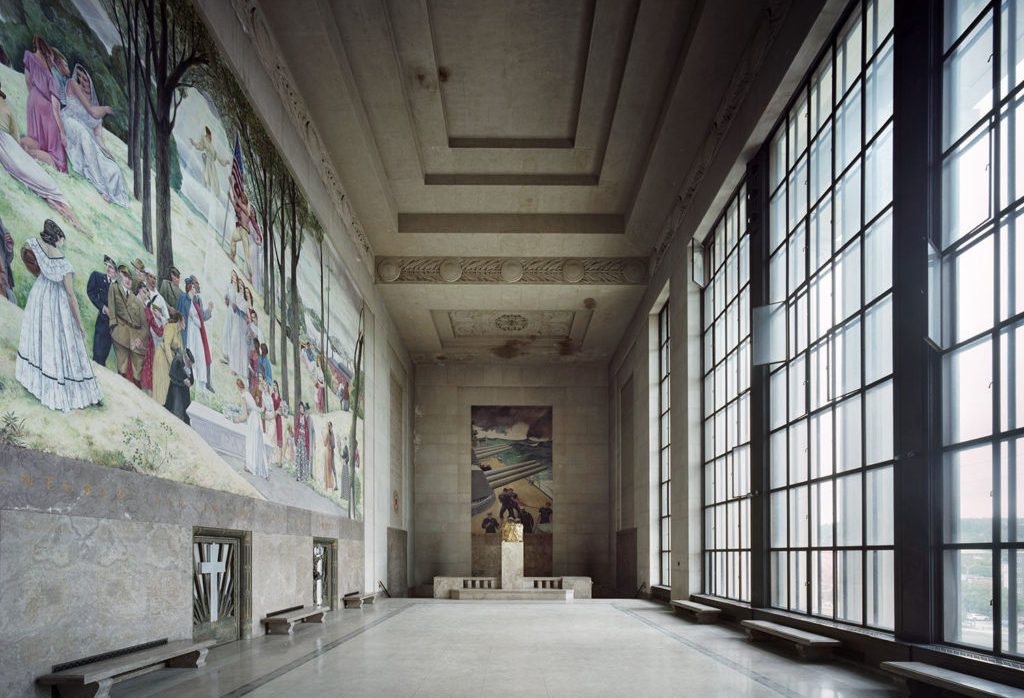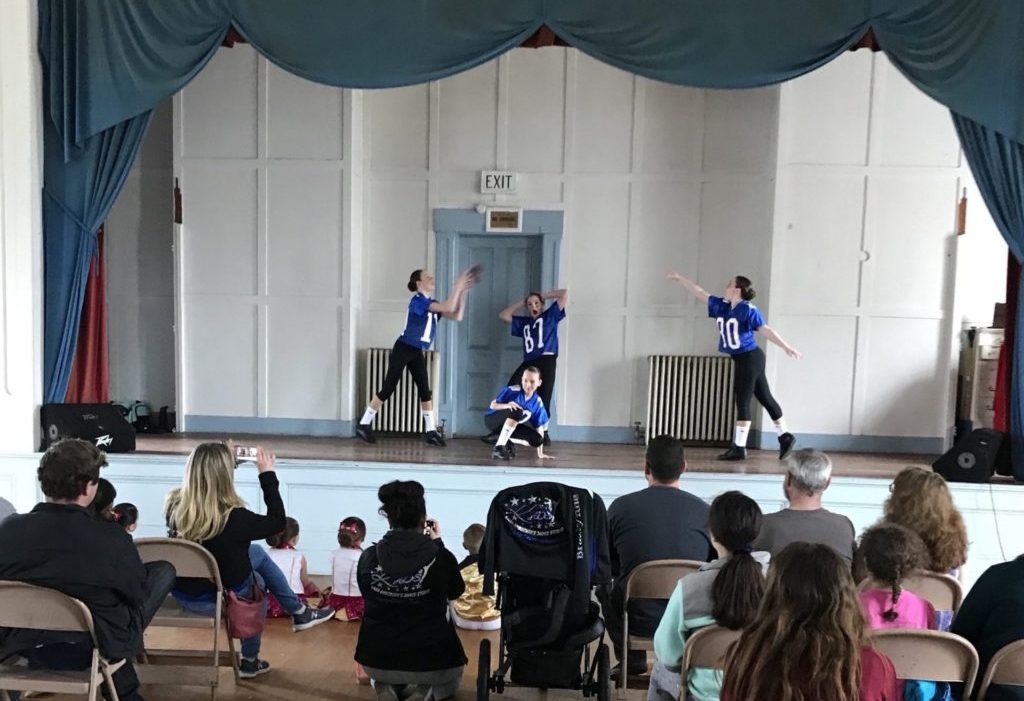What 2020 Meant for AHF and What’s Next in 2021

The Speedway viewed from above. Courtesy of Jason Baker.
“I think this virus is actually going to be a pretty big deal.” No truer words were ever spoken in AHF’s office – and no statement more understated. It was early February, and AHF staff were gathered in the conference room at Old City Hall for our weekly meeting. We had talked about our marketing strategy to bring tenants to the Speedway during what promised to be another boom year for restaurants and artisan retailers. We had marveled at our clients, the Friends of the North Brookfield Town House, who were taking bold steps toward a capital campaign to convert an historic building into a regional arts center. We had discussed the 2020 Main Street Now conference in Dallas, where we were to present on our strategy for advancing stuck preservation projects. Now Sean, AHF’s president, had turned the conversation to the news trickling out of Asia, Europe, and California. “We should probably look into some online meeting software,” he mused, “in case we have to work from home for a few weeks.”
Nine months later, we’re still working from home. AHF has witnessed the vulnerability and resiliency of the communities we serve: the struggling hospitals and food pantry lines; the creativity of small businesses striving to stay afloat; the kindness of strangers helping strangers. Throughout it all, we’ve tried to do our part to support our neighbors while keeping our own projects on track. As we bid good riddance to 2020 and welcome to 2021, we reflect on the work we managed to do during the pandemic, and on our hopes for the coming year.
The Speedway Produce Program

Staff from AHF and Charles River Community Health with the first batch of Speedway Produce boxes.
The shutdown in March exposed food insecurity everywhere, including among our Allston-Brighton neighbors. With the Speedway renovations on hold for six weeks, we looked for ways to support the community. Inspiration came from our friend and colleague, Maggie Battista, who had been delivering hundreds of donated produce boxes to hard-hit communities in Chelsea. Following her model, we launched the Speedway Produce Program in partnership with Charles River Community Health (CRCH) and local wholesaler Katsiroubas Brothers. Thanks to generous donations from community members, the Harvard Ed Portal, Solomon McCown & Cence, and Newburg & Company, we distributed $14,000-worth of fresh produce to CRCH’s most vulnerable members over the course of four months. We’re humbled by CRCH and Katsiroubas Brothers’ continued dedication to making sure that people across Greater Boston have the care and nourishment they need to weather the pandemic.
Speedway Progress Update, December 2020
More than a year into construction, we can see the finish line! Our contractor, D.F. Pray, has been working hard to ensure a spring opening for the Speedway. We’ll let these photos speak for themselves.






ROAR at the Town House

AHF is in awe of the folks in North Brookfield who are turning a stuck preservation project into a catalyst for downtown revitalization. Despite the pressures of life during COVID, an economic decline that has hampered fundraising, and the dismal situation for performance venues, the Friends of the North Brookfield Town House are forging ahead with a capital campaign to redevelop the historic building. Over the past year, they worked doggedly with project partner and music industry professional Bonnie Milner to refine and put a name to the building’s future program: Rural Opportunity through Arts and Restoration (ROAR). A pilot program for what Bonnie hopes will become a national model, ROAR at the Town House will seek to build a creative economy in rural south-central Massachusetts through arts education and cultural programming – all within a restored, locally significant building. Check out the Friends’ new website to learn about this extraordinary project!
The North Schoolhouse – Our Newest Project


The North Schoolhouse — a time capsule
To our surprise, the pandemic doesn’t seem to have slowed preservationists down. We had many conversations in 2020 with people seeking to revitalize historic properties, and one discussion turned into our newest consulting project. The Town of Mount Washington, MA asked AHF to assess the feasibility relocating and restoring the nineteenth-century North Schoolhouse as a civic and cultural space. When we visited the building in November, we fell in love. The brown-shingled, one-room schoolhouse is located along a dirt road in the woods at nearly 2,000 feet above sea level and was once considered the most remote school in the Commonwealth. It looks much as it did 150 years ago: chalkboards, desks with inkwells, and adjustable child-sized chairs line the walls; spelling cards are still scattered across the teacher’s desk; graffiti dating to the 1870s decorates the wood storage room. Together with DBVW Architects, AHF is producing a feasibility study and cost estimates for relocating the building to the town center and restoring it as event and exhibit space. We have also offered (pending Town approval) to provide real estate guidance during 2021 and to assist with preparing an application to the Massachusetts Cultural Council’s Cultural Facilities Fund later in the year.
Worcester Memorial Auditorium

Videographer Padriac Farma flies a drone inside the Shrine of the Immortal at the Worcester Memorial Auditorium. Photo courtesy of Matthew Dickey.
We would be remiss if we didn’t mention our largest and most ambitious project, the Aud. Unsurprisingly, the pandemic has pushed back the timeline on this redevelopment effort, which aims to convert a five-story performance venue and memorial into an academic digital innovation lab, esports arena, and cultural center. We are in the process of applying for Historic Tax Credits and seeking both public and private investment. In the meantime, we have begun an exciting videography project to showcase the Aud’s history and architecture. Keep an eye out for some short videos later in 2021.
As one of the most difficult years in living memory comes to a close, the work AHF does to help communities spark economic and cultural growth has new urgency. Our New Year’s resolution is this: to contribute to a robust recovery that produces vibrant, healthy neighborhoods whose heritage is honored and whose future is bright.
Architectural Heritage Foundation is a 501(c)3 dedicated to stimulating economic development in disinvested communities through historic preservation. Follow AHF and its projects on Facebook, Twitter, Instagram, and LinkedIn.
Learn more about the Charles River Speedway and Worcester Memorial Auditorium revitalization projects.







